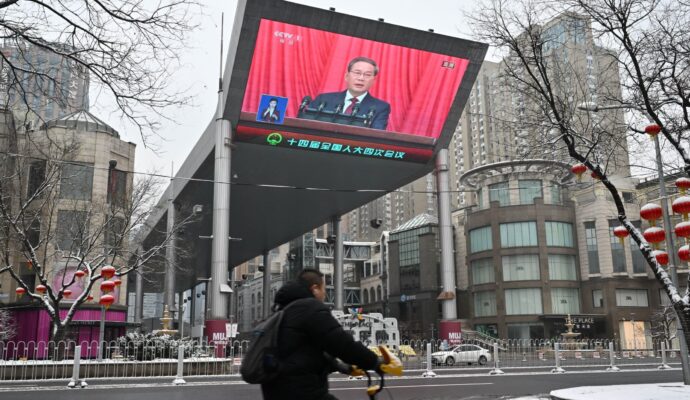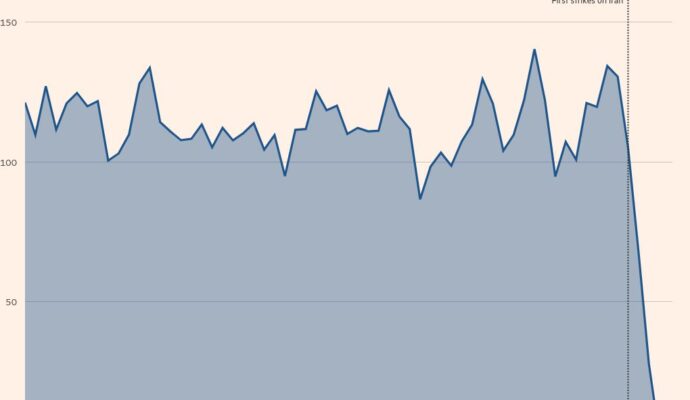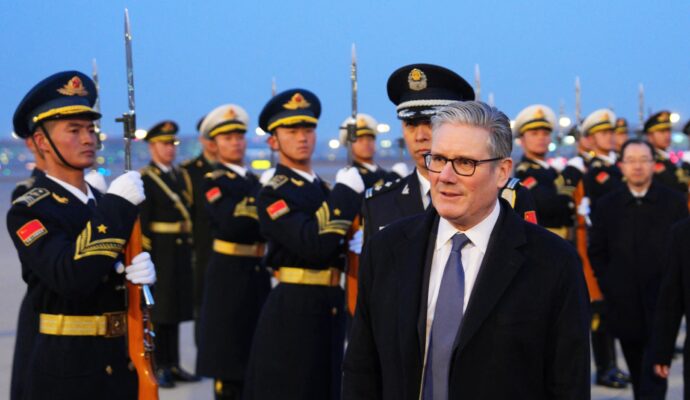Hello everyone, this is Cissy in Hong Kong, your #techAsia host this week.
In recent months, China’s live commerce industry has continued to gain ground, starkly contrasting with global markets. In the first six months of the year, China’s online retail sales exceeded ¥7.4tn ($1.03tn), up 8.5 per cent, partially fuelled by live commerce and instant retail. A recent Cyberspace Administration report even highlighted live commerce as a “vital driver of consumption and export”.
Overseas, even foreign streamers are benefiting from China’s robust and efficient supply chain, with many products shipped directly from China. For instance, south-east Asian customers ordering via a TikTok live stream can receive their purchases in just five or six days.
In China, cross-border ecommerce is booming, with 5,080 new companies registered in the segment in early 2025, almost doubling from the same time in 2024.
Since the start of the year, TikTok Shop has expanded into Mexico, Brazil and Japan, leveraging its “short video plus live streaming” model to blend entertainment and shopping to lure global consumers.
In contrast, the US and Europe have been laggards in adopting live commerce. Japan also appears less than keen to jump on the bandwagon. Launched in Japan in late June, TikTok Shop described its performance there as “very impressive”. But the company didn’t disclose its first-month gross merchandise value (GMV), and other signs point to a less rosy picture.
TikTok trepidation
TikTok’s live commerce feature launched in Japan a month ago amid high expectations that it would challenge ecommerce giants. But the foray appears to be faltering as many companies are reluctant to try a marketing medium that remains relatively untested in the country, writes Nikkei’s Ryo Sato.
Although TikTok users in Japan spend an average of 44 minutes a day on the app, double the figure for Instagram, that hasn’t translated into sales. Early adopters included Unilever Japan, Ya-Man, Lacoste Japan and Nissin Foods, but while the service got off to a brisk start, the number of companies joining has since fallen off.
The slow uptake stems from three key hurdles. First, companies doubt live commerce will catch on in Japan’s cautious market. Second, hesitation persists due to TikTok’s Chinese ownership, raising concerns about buyer trust. Third, the need for specialised talent and facilities to run live streams poses logistical challenges for businesses
Cost of doing business
Donald Trump said he may allow Nvidia to sell a more advanced artificial intelligence chip in China, after confirming he had “negotiated a little deal” to give the US a share of the chipmaker’s revenues from the country, write the Financial Times’ Demetri Sevastopulo and Michael Acton.
The unprecedented deal the president struck with Nvidia’s chief executive Jensen Huang, revealed by the FT, involves the US taking 15 per cent of Chinese sales of its H20 chip, which it introduced in 2023 to comply with Biden-era export controls.
The performance of the H20 chips sold to China is restricted compared with those available to US customers.
Trump on Monday said that he planned to discuss a new deal with Huang to allow Nvidia to sell chips to China based on its latest, and most advanced, Blackwell platform. Approval would unlock billions of dollars in sales for Nvidia after lobbying by Huang for access to the Chinese market, despite security concerns in Washington.
Race for the stars

Rocket Lab, a New Zealand-founded, California-based aerospace company, is making waves in Asia, competing head-on with Japanese launch providers, as Japan’s satellite operators increasingly rely on Rocket Lab’s services to boost its regional presence, writes Nikkei Asia’s Mitsuru Obe.
Japanese players like Canon’s Space One, Toyota-backed Interstellar Technologies and a Honda research unit, which tested vertical take-off and landing in June, are emerging but lag in terms of global outreach as they traditionally focused on domestic needs. Rocket Lab’s focus on cost and speed positions it to capture more of Asia’s expanding space market.
In 2024, Rocket Lab’s primary launch site in New Zealand made it the world’s fourth most-active launch market, surpassing Japan, which ranked fifth. The company’s agility in seizing opportunities — building satellites, selling components, and launching low-cost missions to Mars and Venus — sets it apart. Its 18-metre Electron rocket, capable of carrying 300 kilogrammes, has become the second most-used launch vehicle globally after SpaceX’s Falcon 9, with over 56 orbital launches since 2017.
Thinking big
Danang, renowned for its soft sand, clear waters and iconic Golden Bridge, is looking to transform itself into Vietnam’s finance, technology and trade hub.
In an exclusive interview with Nikkei Asia’s Yuji Nitta and Mai Nguyen, Luong Nguyen Minh Triet, chair of the Danang People’s Committee, outlined plans for an International Financial Center (IFC) to drive the city’s growth and support Vietnam’s goal of double-digit GDP expansion from 2026.
The IFC, approved by Vietnam’s top leaders alongside one in Ho Chi Minh City, will specialise in green finance, fintech, digital assets, and financial innovation. It will be headquartered in a 22-story building at Danang Software Park 2, with additional infrastructure planned on the Son Tra peninsula.
To bolster the IFC, Danang is exploring artificial islands in Danang Bay to expand its financial ecosystem. This ambitious shift aims to attract global capital, positioning the city as a key player in south-east Asia’s economic landscape.
Suggested reads
Tencent says it has ample chips for AI training amid reported purchase halt (Nikkei Asia)
Beijing puts pressure on Chinese tech giants over purchases of Nvidia’s H20 chips (FT)
Applied Materials sued by China rival over alleged trade secrets theft (Nikkei Asia)
SMIC says more Chinese chip players ‘perfectly’ replacing foreign rivals (Nikkei Asia)
Indosat opens AI centre in Papua in symbol of ‘digital awakening’ (Nikkei Asia)
Manus and Benchmark: the AI deal that upset China and the US (FT)
Synopsys says new era dawning in chip design due to AI, robotics demand (Nikkei Asia)
India’s IT services groups race to reinvent themselves for AI age (FT)
China wants US to relax export controls on chips as part of trade deal (FT)
#techAsia is co-ordinated by Nikkei Asia’s Katherine Creel in Tokyo, with assistance from the FT tech desk in London.
Sign up here at Nikkei Asia to receive #techAsia each week. The editorial team can be reached at techasia@nex.nikkei.co.jp


